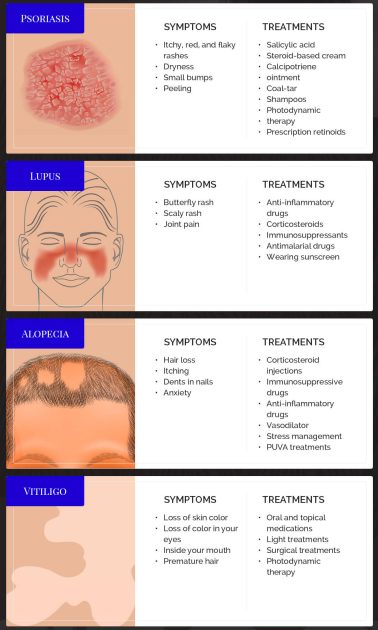Autoimmune Diseases
Our body reacts to autoimmune conditions in many different ways. Autoimmune diseases cause the body’s immune system to attack healthy tissues. In many cases, the autoimmune illness may also affect the skin.
Texas Surgical Dermatology, led by board certified dermatologist Dr. Tri H. Nguyen, provides safe and proven treatments for skin conditions resulting from autoimmune diseases to patients in Houston, Katy, Spring, The Woodlands, Texas, and surrounding locations.

Autoimmune Skin Condition Types
Autoimmune skin diseases are of several different types and are caused when the immune system attacks healthy skin cells.
Psoriasis
Psoriasis is a type of chronic autoimmune disorder which makes the immune system overactive. This speeds-up skin cell growth and causes layers of red plaques covered in scales. These are silver-white, flaky patches of dead skins.
Scleroderma
Scleroderma is a disease of the connective tissue that involves hardening and thickening of the skin. Connective tissue supports, connects, and separates all types of body tissues. Scleroderma can be systemic or localized.
Skin Lupus
Lupus of the skin or cutaneous lupus is an autoimmune skin condition in which the immune system begins attacking healthy cells and damaging the skin. Symptoms generally include itching, redness, scarring and pain.
Behcet’s Disease
This is a rare disorder which causes inflammation of the blood vessels in the entire body. The condition causes eye inflammation, mouth sores, genital lesions, and skin rashes.
Pemphigus
This is another autoimmune skin disease in which pus-filled bumps or blisters erupt on the skin. The blisters develop on the skin but may occur on the mucus membranes as well. Pemphigus blisters can be swollen, itchy and painful.
Treating Autoimmune Skin Diseases
Autoimmune skin diseases can be treated by slowing down hyperactive immune system, managing symptoms, and preventing further complications from arising. Generally, less widespread skin symptoms are easier to treat.
Corticosteroids, like prednisone are one of the most common prescribed treatments for these disorders. The drug mimics the natural effect of hormones that the body produces for suppressing inflammation.
Immunosuppressive drugs are another treatment option for autoimmune skin diseases. These drugs reduce the effect of overactive immune system by suppressing it. These drugs can either be combined with other medications or given alone depending on the condition.
Some of the more popular immunosuppressive drugs used for treating autoimmune skin conditions are:
- Cyclosporine and other calcineurin inhibitors
- Cytoxan (cyclophosphamide), Imuran (azathioprine), and methotrexate among other cytotoxic drugs
- Orencia (abatacept) and Humira (adalimumab) among other biologics
- Simulect (basiliximab) is a monoclonal antibody therapy
Janus kinase (JAK) inhibitors, such as Olumiant (baricitinib), Xeljanz (tofacitinib), and Rinvoq (upadacitinib) may also be used. These drugs are FDA approved for autoimmune conditions in patients that don’t respond or cannot tolerate tumor necrosis factor (TNF) inhibitors.
Other Therapies
Topical ointments may also be prescribed by dermatology treatment providers for relieving pain and other skin symptoms. UV light therapy can provide skin symptom relief in conditions, such as psoriasis. Stress management techniques should form part of the treatment plan since stress and anxiety can make autoimmune conditions worse.
Board certified dermatologist Dr. Tri H. Nguyen receives patients from Houston, Katy, Spring, The Woodlands, Texas, and nearby areas for the treatment of skin conditions resulting from autoimmune diseases.
For More Information contact our Board Certified in Dermatologists at Texas Surgical Dermatology in Spring, TX
For more information on procedures and treatments offered at Texas Surgical Dermatology PA please call 832.663.6566 or click here to contact our dermatologists. Helping patients in Houston, The Woodlands, Spring, Katy and other surrounding areas of Texas.

